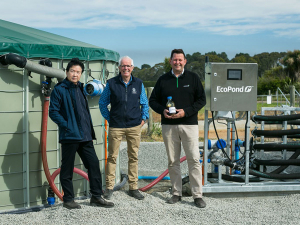Ravensdown partners with Footrot Flats to celebrate Kiwi farming heritage
Ravensdown has announced a collaboration with Kiwi icon, Footrot Flats in an effort to bring humour, heart, and connection to the forefront of the farming sector.
 Lincoln University professors Hong Di, left, and Keith Cameron with Ravensdown's Carl Ahfield. The team responsible for the Cleartech effluent management system has now unveiled EcoPond, claimed to be a breakthrough in methane mitigation. Supplied. Tony Stewart/Photoshots
Lincoln University professors Hong Di, left, and Keith Cameron with Ravensdown's Carl Ahfield. The team responsible for the Cleartech effluent management system has now unveiled EcoPond, claimed to be a breakthrough in methane mitigation. Supplied. Tony Stewart/Photoshots
Ravensdown has unveiled new methane mitigating technology that it claims virtually eliminates the methane emitted from effluent ponds.
Ponds are the second largest source of methane on a dairy farm – behind direct emissions from the animals themselves. Ravensdown says its Eco- Pond system could cut total farm emissions by 4% to 5%.
It also reduces odour and risk of phosphate loss from pond effluent when spread on farm.
EcoPond was unveiled recently at Lincoln University’s Dairy Research Farm. It is an offshoot of Ravensdown’s award-winning ClearTech effluent recovery system and was developed in conjunction with the same team of Lincoln University’s Professor Hong Di and Emeritus Professor Keith Cameron.
The automated “plug and play” in-line system can be retrofitted to existing ponds and uses the same ferric sulphate additive as ClearTech, metered into the pond by a computer-controlled pump and mixing system.
Cameron says the larger the pond, the more micro-organisms there are in the pond to generate methane.
“This new system has been tested in the lab and at farm scale, where it proves enormously effective at essentially nullifying the methane-creating process.”
Di adds that EcoPond reduces the risk of Dissolved Reactive Phosphate loss to water by up to 99%.
The EcoPond is available for farmers to use now. Ravensdown general manager innovation and strategy Mike Manning says the New Zealand dairy sector is already a world leader in carbon emissions efficiency, but the country has set a 10% target of biogenic methane reduction by 2030.
“This new tool in the farmer’s toolbox has the benefit of robust science behind it and will assist farmers who want to start tracking towards that target now,” he says.
Global trade has been thrown into another bout of uncertainty following the overnight ruling by US Supreme Court, striking down President Donald Trump's decision to impose additional tariffs on trading partners.
Controls on the movement of fruit and vegetables in the Auckland suburb of Mt Roskill have been lifted.
Fonterra farmer shareholders and unit holders are in line for another payment in April.
Farmers are being encouraged to take a closer look at the refrigerants running inside their on-farm systems, as international and domestic pressure continues to build on high global warming potential (GWP) 400-series refrigerants.
As expected, Fonterra has lifted its 2025-26 forecast farmgate milk price mid-point to $9.50/kgMS.
Bovonic says a return on investment study has found its automated mastitis detection technology, QuadSense, is delivering financial, labour, and animal-health benefits on New Zealand dairy farms worth an estimated $29,547 per season.

OPINION: Here w go: the election date is set for November 7 and the politicians are out of the gate…
OPINION: ECan data was released a few days ago showing Canterbury farmers have made “giant strides on environmental performance”.